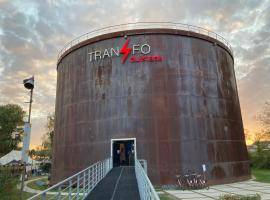RE/SOURCED is a pioneering circular renewable energy project on a former coal fired power plant site in south west Flanders (Belgium). The powerplant was called Transfo.
RE/SOURCED is focused on generating renewable energy for users located within a local community. The project aims to create Transfo smart microgrid, a local smart grid that will provide users with access to the renewable energy that is produced there. In its original design and given the community-level focus, it was anticipated that users would be private citizens, public organisations, businesses or other legitimate user types.
The design of the grid is novel – it includes a DC backbone through which DC generated renewable electricity can be distributed (making it more efficient), a single inverter to covert DC to AC where appropriate and a single point of connection to the public grid. There is a state of art energy management system for the smart microgrid. The proposal also includes a combined heat and power plant, (second-life) battery storage, pumped storage and flywheel.
RE/SOURCED is piloting the integration of a range of energy generation, distribution and storage sub-systems in one facility. This is the pioneering aspect of the proposal – it is ambitious.
Governance of the Transfo smart microgrid will be achieved through forming a co-operative enterprise. Membership will be open to all eligible users/residents.
It was anticipated that having businesses and private citizens within the same community of users might not be possible under Flemish law. It was proposed to use a regulatory sandbox for the project and, following extensive consultation at the design stage, this was concluded to be the best approach. In practice, the sandbox did not allow for businesses and citizens of a single system to be beneficiaries. The project implementation would potentially have stalled if this hurdle was not overcome.
After considerable and intensive reflection, consultation with regulatory and legal advisors, the partners have identified a Closed Distribution Network (CDN) as a possible compromise. This would allow renewable energy to be generated as originally proposed, but would limit the beneficiaries to businesses and municipal bodies. Private citizens could not be “active users” (within current legislative definitions).
Before embarking on the CDN delivery path, the lead partner has prepared an interpretative question for DG Energy of the European Commission setting out why a CDN would be suitable and seeking confirmation that its interpretation of the EU Energy Directive is correct in this regard. This question will be sent to DG Energy in December 2021. Getting clarification on this question will likely be of benefit to the many other municipal organisations attempting to take the lead in facilitating renewable energy production in local communities. It will also introduce, in a practical way, to DG Energy the challenges that current legislation poses for municipalities implementing community focused renewable energy projects. This is an issue for all member states so RE/SOURCED is leading the way in developing solutions.
The project is using public procurement to purchase sub-assemblies for the Transfo smart micro grid – the procurement covers systems and products that are highly technical in nature (requiring not just an understanding of the product’s technical specifications, but also its operating conditions and the other generating technologies on the system). The procurement must also have circularity at its heart and suppliers are being asked specific circularity questions which some are finding difficult to answer. The partners are in the middle of the procurement process presently – there may be future recommendations arising for this learning.






















